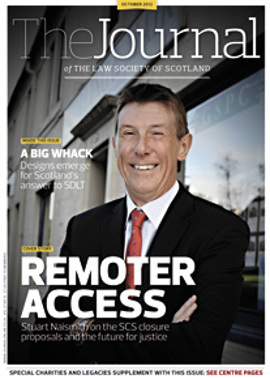On the right track
The first Update seminar in recent years dedicated solely to ethics and professional practice took place in September, and provided a stimulating morning for the full house who attended.
Four out of the five solicitors from the Professional Practice team attended, and it was a chance for the expertise of the whole team to be showcased in the leadup to the retirement of Bruce Ritchie who currently leads the department. The presentations shared recent decisions of the Professional Practice Committee on a wide range of issues and applications, a selection of which appears in the panel. Attendees were also given a refresher on recent developments such as the rules and guidance on drafting wills for connected persons, counsel’s opinion on how to deal with requests by lenders for files where the solicitor has acted for both borrower and lender, and the conflict of interest guidance on corporate guarantees sought by banks. Information on all these is on the Society’s website under “rules and guidance”.
It is for a solicitor’s professional judgment, we were reminded, what parts of the guidance are relevant in the circumstances of a particular case; adherence to every point is not mandatory in the same way as with a practice rule, but non-compliance will be taken into account in the event of any complaint, and the solicitor will have to justify a decision to depart from the guidance.
More challenging was the workshop session, where we had to consider actual scenarios and decide how the solicitor should proceed. Certainly my group struggled with the problems posed – an eyeopener as to the expertise available to deal with such enquiries from practitioners.
The new head of the team, Coral Riddell, was also on hand to talk to members and gain ideas for further support the Society could offer – plans discussed included raising the profile of the whole team, delivering more CPD to support members, and contributing more regular articles to the Journal in the future.
Some committee decisions
Status of principals and others
The Society’s rules provide that the “status and designation” of people who are not principals in a practice must be “clearly and unambiguously stated” on office stationery, websites etc so as to distinguish them from the principals. Some large firms use terms such as “director” to describe people who are not principals but have a higher status than assistants or associates.
If the practice unit is a limited company, the term “director” is restricted to those who are actually directors of the company. However it can be used to describe people who are not members of an LLP or partners in a partnership.
“Partner” can never be used by anyone who is not a principal, and in an LLP the word “member” can only be used by those who are actually members of the LLP.
Practising as a principal
The committee regularly receives requests for waivers, particularly in the current financial climate, from the practice rule prohibiting people who have not been employed for three years as solicitors with an unrestricted practising certificate, from setting up their own practice. The committee does not readily grant waivers, as it is strongly of the view that there is a public interest in preventing people with limited experience from setting up in practice on their own.
Successful applicants for a waiver have been able to demonstrate considerable experience (upwards of two years); that they have a business plan; that they have lengthy experience in another jurisdiction or as an advocate; and/or that they are willing to restrict their practice to a particular area such as criminal court work.
Solicitors moving firms
A practice guideline allows partners and consultants moving firms to contact clients for whom they have acted directly, to tell them about their move and offer to continue acting, provided no undertaking to the contrary has been given to the firm being left. But assistants and associates are not allowed to make such direct approaches, unless they are the nominated solicitor in a legal aid certificate.
A fairly recent change to the advertising rules does allow a “general circulation” of material promoting a solicitor’s practice, but an assistant was held to have gone beyond what was permitted by including a form of mandate with a circular to clients for whom they had acted at their former firm.
Quality Solicitors
The committee has looked at the Quality Solicitors brand, and its marketing campaign. Quality Solicitors is not an ABS: law firms simply share a common branding with other firms, for a price. The Society’s rules on sharing fees with unqualified persons allow firms to pay a marketing fee, which this is, provided it is not a percentage of fees from cases introduced.
In this issue
- Players and winners
- Access to client money?
- Tax and residential property
- Trusts and the family business
- Planning: the next level
- Reading for pleasure
- Opinion: Tom Mullen/Alan Paterson
- Council profile
- Book reviews
- President's column
- Deed plan criteria
- Decision time for justice
- "Can do": can you?
- Taxes heading north
- When the agent answers
- Taking care of child cases
- Collective redress
- Making sense of hearsay rules
- Don't forget the register
- Alcohol: the healthy option
- Seeding scheme is a draw
- Scottish Solicitors' Discipline Tribunal
- Human trafficking: is the system responding?
- Power points and positive rights
- A way to apply yourself
- Society presents "ambitious plans"
- Law reform roundup
- Business benefits
- On the right track
- Ask Ash
- Business radar
- Legacies: the untapped potential
- Charity begins at law
- Love them and leave to them
- Those difficult relatives






